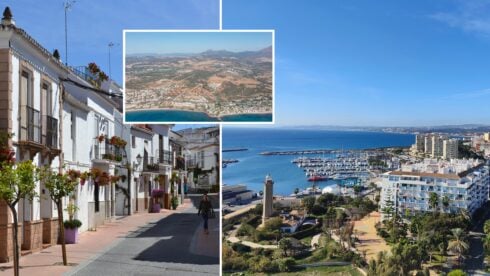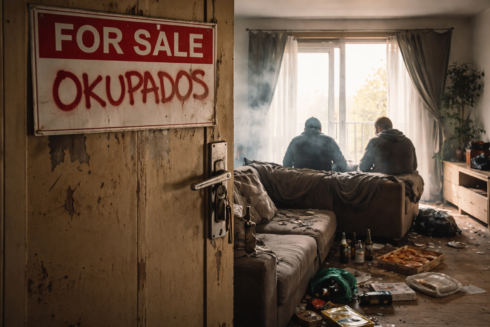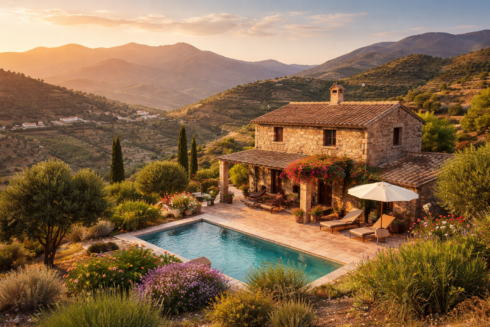By Graham Govier
IF you thought you only found a glut of empty and overpriced developments on the coast you would be wrong.
Inland towns such as Fuente de Piedra, Humilladero and Mollina – to name just three – have a huge number of ugly and unwanted apartment blocks scarring their outskirts.
It all came about since 2007 when the local authorities – in a bid to milk the development cash cow – allowed the vast majority of these schemes to go up.
They didn’t actually think about demand for these ‘white elephants’. And the recession has only made them even less desirable.
I continue to ask myself why does greed always seem to outweigh every other human emotion, regardless of civic and moral responsibilities?
In inland Andaluicia – just as it happened on the coast – the local authorities, architects and developers colluded with the banks to allow it to happen.
Who would buy one of these cramped and pokey apartments?
But giving planning approval and finance for these developments has proved a grave error. Because who in their right mind would buy one of these cramped and pokey apartments, with their tiny terraces and neighbours sometimes less than two metres away?
And particularly now when you can get a four bedroom home and garden for the same price.
As a member of the PP party in Mollina, I have been campaigning since 2006 against these unnecessary ‘ghetto’ developments.
In 2001 when I started developing urban land, planning restrictions were logical and took into account their future impact on the environment.
At the time a minimum plot size of 200 square metres was the requirement to build a single or two-storey house, which was plenty.
But nearly every year since then, planning departments have eroded the minimum requirements to the extent that now just 70 square metres is required to build a house.
Even when property prices were rising, there was no justification for it.
From 2002 until 2006 my company built (and sold) 86 three and four bedroom properties. And while profit was of course the driving force, I took on board certain responsibilities regarding the environment, size and style of the homes.
I had a sense of civic responsibility. After all, I lived in the area.
This is why it makes me so angry to see these ridiculous projects.
Most of them are empty and many already starting to degrade.
The owners and the politicians have few clues what to do. In fact, half the time they look like frightened rabbits in the headlights when you ask them.
They know they have made a huge error.
After all, there are up to 1.5 million empty homes in Spain and house prices have fallen by up to 40 per cent over the last year alone.
These pokey apartments, which the banks have often lent money on to the value of up to 120,000 euros, are perhaps today worth just 60,000 euros.
And at that price there are still few takers. Because while there are quite a large number of smart buyers snapping up bargains, it is not these sort of properties they are after.
As one of the few remaining inland estate agencies, I steadfastly refuse to put these developments on my books.
When the local developers or banks ask me why, I tell them straight: ‘These homes are not sellable. Sorry.’
My solution would be for the Bank of Spain to negotiate the purchase of these failed projects with the relevant private banks and pass direct ownership to the particular local authorities.
Financing could be on an interest-only basis for two years and the properties could then be utilised for social housing.
And this does not mean ‘VPO’ (or first time buyer subsidised housing) but proper council housing for people who need it and right now there is no shortage of them.
Sure this might appear to be a move in the direction of socialism, but this is not the time to be playing politics.
To leave them unoccupied for much longer will see them dilapidate with even more expense required to make them habitable.
Meanwhile, the queue for social housing gets longer.
Perhaps if put under local authority care it might just force councils to review their planning policies and get back the civic responsibility that we demand from them.
And let’s not forget that 2011 brings local elections and an opportunity for change.
I just find it terribly sad that so far I have seen no political party coming up with any decent solution to the problem. Surely someone must see sense?
Visit www.inlandandalucia.com
Click here to read more News from The Olive Press.






Graham, have you ever visited one of these apartment blocks that are actually lived in.
When we moved into our flat in a block that had only been built 5 years before, it was early winter and as Guadix is situated behind the Sierra Nevadas it has a continental climate and so is very dry and cold.
We were invited into the apartment of a very friendly sheperd called Pepe. We were introduced to his family and sat down around a table to join in with a ham and cheese snack.
As everyone sat down they pulled the polar fleeced table cloth over their legs – these ‘tablecloths’ are called mantas.
We had noticed how cold the flat was and the reason that the Spanish use these ‘mantas’ is because nobody who earns a normal slary can afford to use the gas central heating.
Why is this, because the cowboy built apartment blocks (and they are all cowboy built) don’t use any insulation around pipes or if they do it is entirely useless. not only this but the central heating pipes are then built into the external walls so that they are heating the outside – unbelievable but true.
The double glazing has two panes of glass but is totally useless and badly fitted. Doors are very pretty veneered chipboard and draughts are the order of the day.
In a word Spanish construction is simply crap – you freeze in the winter and roast in the summer.
The best thing to do with the enormous amount of these rubbish apartment blocks is to use the developers as slave labour to pull them down and start again.
Spain has no oil or gas, it all has to be imported. Had these idiots built properly specified apartment blocks, their import bill for gas and oil would be at least half as much as now and don’t forget the price of oil and gas will only rise in the future.
Did I mention privacy – there is none. All internal walls, including party walls are 60mms – yes that’s right 60mms.
Obviously you have noticed none of this but anyone can see into a Spanish building site for themselves.
Pull all this crap down and start again and this time give a little bit of space aroungd each apartemt block – not hard to do in a country as large as Spain.
Why apartment blocks instead of individual homes – easy one to answer that – more profit. In northern Europe construction companies work on an average of 15% profit but in Spain it was 40%.
Stuart is right. I work in construction (when I can) and was astonished when I first realised how amazingly thin the walls are inside new build apartments. Plus no insulation is possible in such thin walls. Pipes are very often just buried in floors and walls with no insulation but more importantly with no sheathing either used to protect the copper from the corrosive effects of concrete. While sheathed copper in concrete should be fine in a dry stable building most new andalucian buildings I have seen have little or no damp-proof course. So the combination of exposed pipes in damp concrete with no expansion room, after about ten years, can keep me very busy. Sadly no-one down here has heard of the equivalent of BS 6891.
Ben,
another really stupid idea is to include balconies in these apartment blocks.
Dense concrete is a heat sump, then make it worse by using re-inforcement steel, which you have to or the balconies would fall down. Steel is a wonderful conductor, which means it transfers the heat of summer and the cold of winter into the building where more re-inforcing steel transfers it around the apartment.
These stupid architects could solve at least part of the problem by de-coupling the balconies from the main structure – que?
They could also specify aercrete blocks,real double glazing and deeper balconies that would keep the sun from hitting the glass but that would mean a little intelligence – que?
They have loads of ‘BS’ in Spain, Ben. Architect has a very loose meaning here.
Oh silly me, I read the first few lines of the article and made an assumption.
Graham Govier knows all about crap Spanish construction – no wonder he never came back with any comments.
Tell us Graham did you insist on 1 hour fire doors to kitchens with automatic closures. Did you insist on proper insulation for all pipes. Did you insist on REAL double glazing – you know the list.
And now we come to your real reason for buying up all the unsold properties for social housing – as long as they remain unsold it will pull prices for all property down – ergo they are a drag on your business – memo to self – read the whole article.
Ouch.
Ben, all Graham is saying is that his houses are bigger not better and larger balconies means more heat and cold entering his houses.
Now would’nt it have been good if he had specced his houses to a north European standard, that would have been something to be proud of.
I was warned by a very well known Spanish interior designer not to bother sending plans for my alt. energy house for approval to the School of Architects – they would take one look and block them forever.